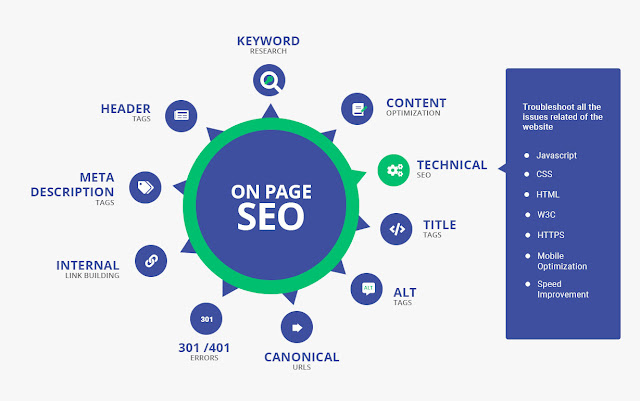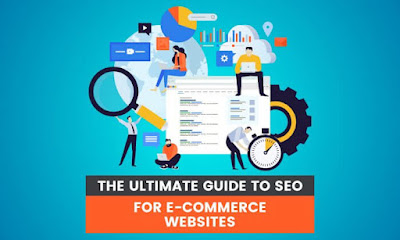What is ON_ page SEO
SEO optimization is of two types: On-page SEO (BON) and Off-page SEO (OBN). BON includes technical elements such as meta descriptions, page title tags to link to pages, and keywords in the title tag for text search engines like Google. It also helps search engine spiders, crawlers, and other bots understand how many new web pages a website.
Off-page SEO includes things like links, social media
links, internal links, keyword-rich URLs, etc. This is where our focus is on
optimizing your site's title tags and meta descriptions so that they are well
SEO optimized by using high-quality content.
SEO Optimization Methods
SEO is all about creating great content for web pages. The
more you write and publish good content then the higher chance your site will
rank for any keywords searched by users.
As an example, if I were to type “best laptop” or “best
camera’’ into Google then this is what I would find:
You can see there is not much competition around these
search terms but if we had 1000 or even 5000 web pages it might not be too bad.
Google pays pretty much in advance for those kinds of searches!
There are a couple of ways to improve your chances of
getting found when people search for a specific query. For instance, I’ve
written some posts here that explain how to increase organic traffic.
One way you can do this is by targeting keywords related
to the product, service, or industry you provide, especially if that product is
widely known through the word of mouth. We have just written a post on how to
target niche markets with lots of product reviews! To find out more read our
article!
Another way you can do this is by writing blog posts. You
could write anything long that covers everything in-depth about whatever
subject matter you’re blogging about. Or you could even consider starting your
affiliate products. But the key to success with these things is to produce
something truly outstanding! And most importantly don’t try to sell your idea
until after you’ve built up enough trust that people won’t look at another
option.
How to Improve Your Blog Post Quality and Ranking
To get better rankings for articles on your blog, make
sure you always have one of your posts published first! Once you have created a
draft you should have a few options:
1- Edit them or rewrite them
2- Write a few thousand words which is not very much to
start with. It will give a lot less time to edit them down later if you write
and publish right after writing so you don’t miss a day.
3- Submit drafts to a community writer who does most of
the editing work for small bloggers. He or she will read your blog post,
comment on it and work out your mistakes! As soon as he submits your draft it
will be ready to go. They will check everything before publication and you will
likely have lots of improvement opportunities.
4- Publish by hand! No matter how good a copywriter you
are, nobody can help you get it perfect unless you’ve done it yourself. Don’t
use shortcuts. Unless you can afford someone else to proofread your work, avoid
using shortcuts or any other word-of-mouth methods.
5. Upload your documents to a document hosting provider so
anyone looking can view them in full if they wanted to, no doubt. Even better
if your work is a pdf (or maybe a jpg if it’s a PDF or HTML document). If you
want some free help from somebody please contact us.
6- Do away with duplicate content or misleading
information! A lot of bloggers copy their content and put it on their stories
without knowing it’s taken out from somewhere else’s post. So your audience
might think something different based on the original post and it may cause
confusion. Save all documents before you publish and submit them to the
community writer.
7- Don’t forget to cite your sources. I think everyone
knows this but we make this mistake sometimes! When you create your piece of
writing then the citation that goes along with it gives it value and authority
in other publications. Cite all relevant sources and make sure people know it
when they come across them. More info on the citation on Wikipedia (or Google
it!).
8- Make sure you include a sitemap.xml file for every project or file you create. Include it in the folder or folder structure of your account that you control. Include every other file you create in that same folder in the future. Think of it as a template so you never forget.
9- Share on Social Media
If you have a Facebook business page set the update
frequency of posts at least once a day. Set a reminder post to update later
using Push Notifications! Also, add your latest posts at the bottom of your
story to keep posting new stuff all the time. Add a new section for comments
and answers and include RSS feeds so that readers never need to look there.
Make sure you have the correct tags in place so when someone arrives on your
webpage they can click on your feed and find your next post.
10- Create Unique Content
Once you feel completely satisfied with what you’ve
created then start creating unique content and publish it! People are searching
for your unique voice and content so make it!! Always make use of multiple
formats to tell your unique story.
11- Keep publishing! Don’t settle for one piece unless you
can pull it together into something amazing! Don’t stop posting regularly
either. Posting will attract more readers and you will see increased traffic
toward your site as well as more backlinks!





But have you ever wondered what the difference is between good websites and great websites Or whether or not the Web Development services Lahore can make it more efficient for your business?
ReplyDelete